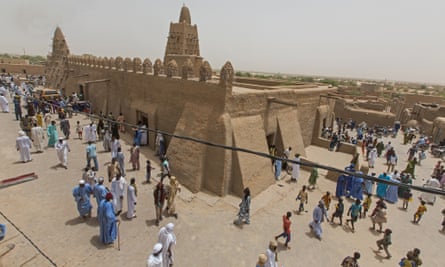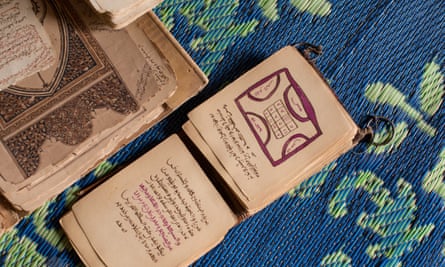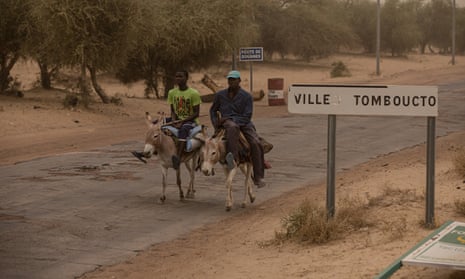It is famously remote, a byword for the impossible-to-reach. In recent times, it has been occupied by jihadis who took pickaxes to the tombs of its medieval saints and burnt or stole thousands of its manuscripts. Now, Timbuktu may be the setting for a $80m (£50m) university in the Sahara.
Architect’s drawings of Timbuktu university show a design in the shape of a snowflake, with roads radiating outwards from a central hub. The campus would be sited away from the town on the road between Timbuktu and Kabara, the historic trading port on the river Niger where goods were transferred from camel to canoe, and will contain a library and large central auditorium as well as lecture theatres and accommodation.
According to Mali’s minister of culture, N’Diaye Ramatoulaye Diallo, the proposed Timbuktu university will offer courses covering everything from literature to farming to renewable energy.
With temperatures in the desert regularly hitting 50C, there is a clear opportunity to develop solar power around the town, but Timbuktu also has a surprising expanse of green agricultural land irrigated by the Niger, 8km to the south. “We are planning to do a huge agriculture programme there,” said Diallo. “When people think of Timbuktu they think desert, they don’t think about agriculture at all, but it will be one of the main projects there.”

In a reflection of the city’s history as a centre of Islamic learning from the 14th to 16th centuries, courses would also be taught in the history of its manuscripts, several hundred thousand of which are now in the capital, Bamako, but will be sent back north when conditions allow. Discussions have been held with the owners of libraries in the city about how their expertise and collections might be used in teaching.
The Malian government has been in talks with philanthropists and international financiers including the Jeddah-based Islamic Development Bank about funding for the project.
According to Diallo, the university would be the keystone of a series of development projects in the city coordinated by the Timbuktu Renaissance Action Group which are designed to reinvigorate the northern economy after the crippling occupation of 2012 and 2013, during which more than half a million people fled the region for the south and neighbouring countries. Many refugees have since returned, but recent months have seen an increase in violence against the UN peacekeeping force, Minusma, and numerous hijackings of aid vehicles that has left many Timbuktians feeling unsafe, and made the northern economies sluggish. The town is still too dangerous for tourists, and unemployment is rife: “We have nothing to do but sleep and eat,” one returned refugee in Timbuktu told the Guardian.
The Timbuktu Renaissance project includes a deal with Google to let the company film the city and digitise its manuscripts. According to Diallo there will be a Google Street View version of the city, but users will also be able to go on a virtual tour for a fee. “It’s going to be a tourist tool for us,” says Diallo. “They wanted to make it in a way that you can visit Timbuktu completely, you can see the manuscripts, you can visit the mosques, the monuments, everything that is in Timbuktu. They will come to film it, photograph it and you will be able to go through that virtual tour. They will also bring storytellers, so you will not only be viewing the city but hearing people speak about all the stories of Timbuktu.”

There are also plans, supported by Bono, to bring back the Festival au Desert, a celebration of Tuareg music that has attracted western musicians such as Robert Plant, Manu Chao and Damon Albarn. The festival, which used to take place at Essakane, two hours’ drive from Timbuktu, was cancelled in 2013 for security reasons.
Diallo is determined to turn the threat posed to Timbuktu’s cultural heritage in 2012, and the global interest generated by the saving of the manuscripts, to the city’s advantage. “I think [the university] would be the best development ever, while bringing back the Festival au Desert would be a boost on the touristic side.
She plans to launch the first step of the Google project by mid-November, along with the university project, subject to the approval of Mali’s president, Ibrahim Boubacar Keïta. “Now everybody is talking about Timbuktu Renaissance in the US, and the university is part of that renaissance. It is incredible. It is a dream project – one that I hope will come true,” she said.

Comments (…)
Sign in or create your Guardian account to join the discussion